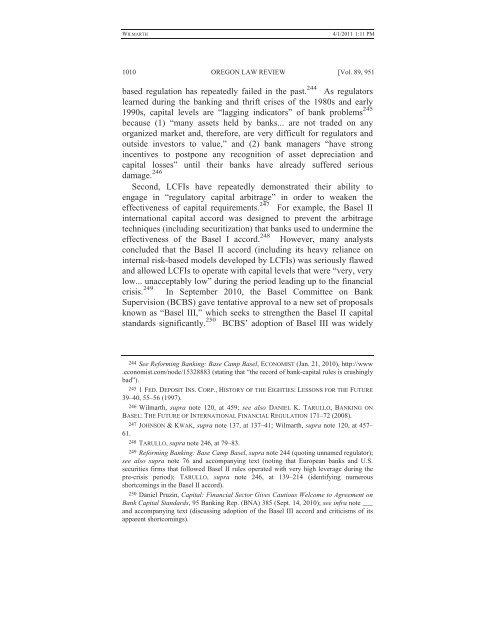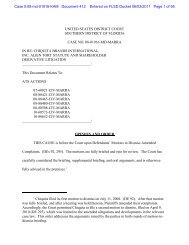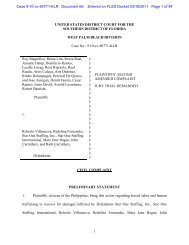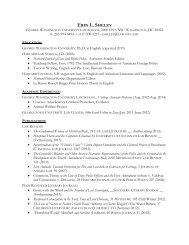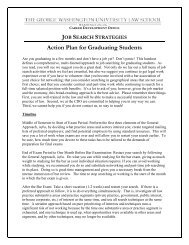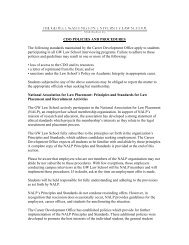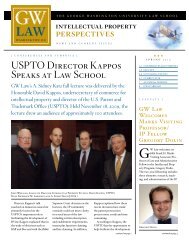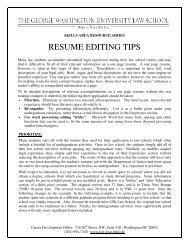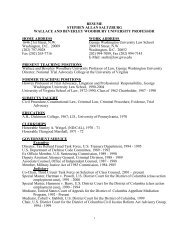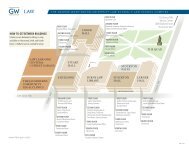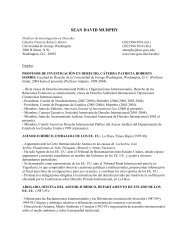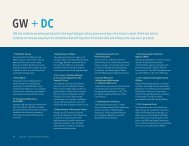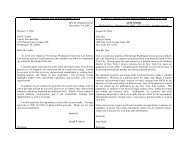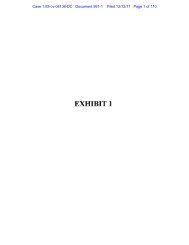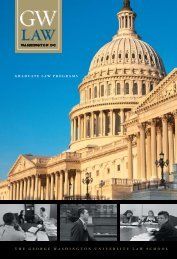CLE Materials for Panel #1 - George Washington University Law ...
CLE Materials for Panel #1 - George Washington University Law ...
CLE Materials for Panel #1 - George Washington University Law ...
You also want an ePaper? Increase the reach of your titles
YUMPU automatically turns print PDFs into web optimized ePapers that Google loves.
WILMARTH<br />
4/1/2011 1:11 PM<br />
1010 OREGON LAW REVIEW [Vol. 89, 951<br />
based regulation has repeatedly failed in the past. 244 As regulators<br />
learned during the banking and thrift crises of the 1980s and early<br />
1990s, capital levels are “lagging indicators” of bank problems 245<br />
because (1) “many assets held by banks... are not traded on any<br />
organized market and, there<strong>for</strong>e, are very difficult <strong>for</strong> regulators and<br />
outside investors to value,” and (2) bank managers “have strong<br />
incentives to postpone any recognition of asset depreciation and<br />
capital losses” until their banks have already suffered serious<br />
damage. 246<br />
Second, LCFIs have repeatedly demonstrated their ability to<br />
engage in “regulatory capital arbitrage” in order to weaken the<br />
effectiveness of capital requirements. 247 For example, the Basel II<br />
international capital accord was designed to prevent the arbitrage<br />
techniques (including securitization) that banks used to undermine the<br />
effectiveness of the Basel I accord. 248 However, many analysts<br />
concluded that the Basel II accord (including its heavy reliance on<br />
internal risk-based models developed by LCFIs) was seriously flawed<br />
and allowed LCFIs to operate with capital levels that were “very, very<br />
low... unacceptably low” during the period leading up to the financial<br />
crisis. 249 In September 2010, the Basel Committee on Bank<br />
Supervision (BCBS) gave tentative approval to a new set of proposals<br />
known as “Basel III,” which seeks to strengthen the Basel II capital<br />
standards significantly. 250 BCBS’ adoption of Basel III was widely<br />
244 See Re<strong>for</strong>ming Banking: Base Camp Basel, ECONOMIST (Jan. 21, 2010), http://www<br />
.economist.com/node/15328883 (stating that “the record of bank-capital rules is crushingly<br />
bad”).<br />
245 1 FED. DEPOSIT INS. CORP., HISTORY OF THE EIGHTIES: LESSONS FOR THE FUTURE<br />
39–40, 55–56 (1997).<br />
246 Wilmarth, supra note 120, at 459; see also DANIEL K. TARULLO, BANKING ON<br />
BASEL:THE FUTURE OF INTERNATIONAL FINANCIAL REGULATION 171–72 (2008).<br />
247 JOHNSON & KWAK, supra note 137, at 137–41; Wilmarth, supra note 120, at 457–<br />
61.<br />
248 TARULLO, supra note 246, at 79–83.<br />
249 Re<strong>for</strong>ming Banking: Base Camp Basel, supra note 244 (quoting unnamed regulator);<br />
see also supra note 76 and accompanying text (noting that European banks and U.S.<br />
securities firms that followed Basel II rules operated with very high leverage during the<br />
pre-crisis period); TARULLO, supra note 246, at 139–214 (identifying numerous<br />
shortcomings in the Basel II accord).<br />
250 Daniel Pruzin, Capital: Financial Sector Gives Cautious Welcome to Agreement on<br />
Bank Capital Standards, 95 Banking Rep. (BNA) 385 (Sept. 14, 2010); see infra note ___<br />
and accompanying text (discussing adoption of the Basel III accord and criticisms of its<br />
apparent shortcomings).


